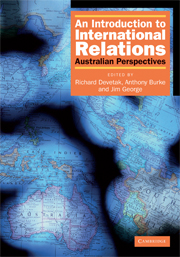Book contents
- Frontmatter
- Contents
- List of tables, figures and boxes
- List of contributors
- Preface and acknowledgments
- An introduction to international relations: the origins and changing agendas of a discipline
- 1 Theory and practice in Australian international relations: the search for identity and security
- Part 1 Theories of international relations
- Part 2 The traditional agenda: states, war and law
- 10 The modern state and its origins
- 11 Nationalism and war
- 12 Security
- 13 Arms control
- 14 The changing character of warfare
- 15 The ethics and laws of war
- 16 International law
- 17 International society and european expansion
- 18 Order and decolonisation in Southeast Asia
- 19 The cold war
- Part 3 The new agenda: globalisation and global governance
- Glossary of terms
- Bibliography
- Index
- References
13 - Arms control
from Part 2 - The traditional agenda: states, war and law
- Frontmatter
- Contents
- List of tables, figures and boxes
- List of contributors
- Preface and acknowledgments
- An introduction to international relations: the origins and changing agendas of a discipline
- 1 Theory and practice in Australian international relations: the search for identity and security
- Part 1 Theories of international relations
- Part 2 The traditional agenda: states, war and law
- 10 The modern state and its origins
- 11 Nationalism and war
- 12 Security
- 13 Arms control
- 14 The changing character of warfare
- 15 The ethics and laws of war
- 16 International law
- 17 International society and european expansion
- 18 Order and decolonisation in Southeast Asia
- 19 The cold war
- Part 3 The new agenda: globalisation and global governance
- Glossary of terms
- Bibliography
- Index
- References
Summary
Introduction
This chapter examines the evolution and practices of arms control in international relations. It begins by discussing what arms control is and why it has featured so prominently in world politics, even after the ending of the Cold War, the period during which arms control can be said to have developed extensively. After a discussion of the various weapons that are covered by arms control processes, and the legal regimes that accompany these, the chapter proceeds to outline some of the ways in which arms control can be conceptualised and how various schools of thought in international relations can be related to arms control practices. We then look at the specific case of the nuclear weapons regime, as more states acquire nuclear weapons, and as calls continue for the elimination of these particular weapons of mass destruction. The chapter also examines how Australia has been involved in upholding various arms control and disarmament regimes, including its contribution to the nuclear weapons debate.
What is arms control?
Arms control can be described simply as any arrangement made between adversaries to limit the weapons that might be used in warfare between them. A more formal, or classical, definition of arms control is provided by Australian writer Hedley Bull: ‘Arms control is restraint internationally exercised upon armaments policy, whether in respect of the level of armaments, their character, deployment or use’ (Bull 1961: 2).
- Type
- Chapter
- Information
- An Introduction to International RelationsAustralian Perspectives, pp. 155 - 166Publisher: Cambridge University PressPrint publication year: 2007



